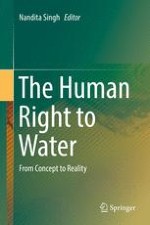2016 | OriginalPaper | Buchkapitel
3. Monitoring and Evaluation of Rural Water Supply in Uganda: Implications for Achieving the Human Right to Water
verfasst von : Andrew Quin, Berit Balfors, Marianne Kjellén
Erschienen in: The Human Right to Water
Aktivieren Sie unsere intelligente Suche, um passende Fachinhalte oder Patente zu finden.
Wählen Sie Textabschnitte aus um mit Künstlicher Intelligenz passenden Patente zu finden. powered by
Markieren Sie Textabschnitte, um KI-gestützt weitere passende Inhalte zu finden. powered by
